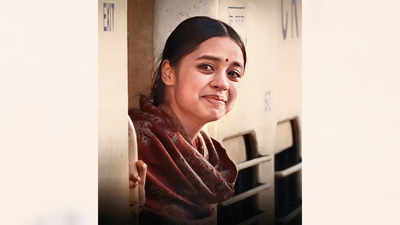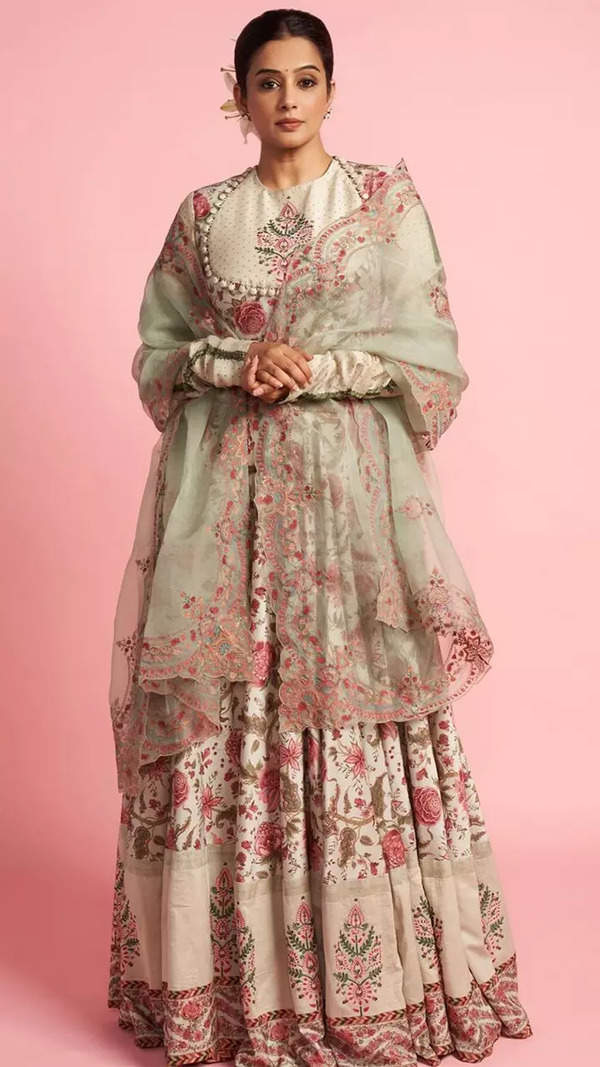- News
- entertainment
- hindi
- bollywood
- Being laapata is a wish fulfillment theme for women characters
Trending
Being laapata is a wish fulfillment theme for women characters
‘A lost character in films can have infinite possibilities, making it a tempting trope’

Laapataa Ladies
"I’m really interested in women running away and finding their own happiness and their lives. It’s a theme that appears in all the stories I have written – women just leaving behind the responsibilities that tie them – family, jobs, whatever it is,” said Kiran Rao during a discussion on her film Laapataa Ladies, which tells the story of two women who get lost and ultimately discover their identities and self-worth.It was a similar thought that led Imtiaz Ali to his film Highway – “if a girl is taken away from her life, will she want to come back?”
Writers share that being laapata is a wish fulfillment theme, and as find-yourself stories go, there have been plenty of films in recent years that reiterate that. Whether it’s Phool in Laapataa Ladies, who realises she wants to work no matter how inconsequential it maybe, Shashi Godbole in English Vinglish, who overcomes her insecurities by learning a new language in a new city, or Rani in Queen, who learns to embrace her identity independent of a man, these films celebrate the self-discovery and realisation of these women and the journeys they undergo to reach them. Writers share what it is about this theme that intrigues them.
‘THE CONCEPT OF LOSING ONESELF AND FINDING A TRUER SELF PROVIDES INFINITE NARRATIVES’
Be it Queen, Highway, Jab We Met or Laapataa Ladies, an underlying theme that recur through these films is that the protagonist finds her voice, rejects norms and gains more agency. Writers suggest that women escaping their familiar scenarios for a life beyond can lend itself to dramatic storytelling. Sneha Desai, writer of Laapataa Ladies, shares that the growth and character development arc of the two women in the film, comes only after they are lost. She says, “Phool, who at the outset refuses to take her husband’s name, shouts his name out in public to be found, decides to help him out in life and earn a living, and Jaya, who has impulsively run away, strategises fearlessly to make the most of a chance that life has given her.” She says the concept of losing oneself and then finding a truer self provides infinite narratives. Desai adds, “The lost character can encounter bad people, good people, ghosts, meet with an accident, can learn, unlearn. Anything is possible, and hence it is a tempting trope for filmmakers and writers. Phool meeting Chhotu and Manju Maai, Jaya helping Deepak’s mother and sister-in-law evolve are examples of how one’s being changed and how one can influence others in the process. Some beautiful paths cannot be discovered without getting lost, and some beautiful films would not have been made but for this premise.”
The concept of women running away to find themselves is not new to Indian cinema. Writer Anu Choudhary says, “Dig deep and we will find several women in our mythology on this quest of standing up for themselves and fearlessly running away from a situation that doesn’t serve them. We can’t have enough of this theme in our films, for every time a woman escapes an ill-deserved situation forced upon her by deep social conditioning, she gives hope to millions of other women. Bhumika (1977, starring
Women eloping in films in some way represents that they want to break some shackles and elopement is the physical act of that desire. As a writer, if the theme is strong enough, it’s interesting to put that woman into quite a few adventures as they may lead her to a self-discovery – Saiwyn Quadras, Executive Committee Member, The Screenwriter's Association of Ind iawho has written Neerja and Mary Kom Zama Habib, General Secretary, The Screenwriter’s Association of India says, “Lajja (2001) is one film that comes to my mind. Vaidehi (Manisha Koirala) runs away to escape her husband and save her unborn baby. Through her journey she meets many women (interestingly all named after Sita -– Maithili, Janaki, Ramdulaari). Vaidehi witnesses the plight of Sita in different forms in today’s world and musters the courage to fight back. Jab We Met (2007) is one example where Geet believes in love and runs away only to discover that she has been betrayed. She doesn’t have the face to go back to her family. Aditya helps her re gain her self-belief.”
‘THE SO-CALLED SAFE SPACE OF A HOME IS OFTEN THE MOST RESTRICTIVE PLACE FOR A WOMAN’
Pooja Tolani, who wrote the segment The Mirror in Lust Stories 2 (2023), shares, “The reality of our society is that often the so-called ‘safe space’ of a home is the most restrictive place for a woman to be in. It’s the freedom from judgement by her own people that sets her free. When we talk about women’s safety, we almost always talk about the issue in context to public spaces. But so many times these public spaces feel safer. The conditioning of families wanting to ‘protect’ their women, at the cost of their potential and desires, is claustrophobic, to say the least. Perhaps this is why such stories find resonance.”
‘Making a fresh start is a theme we all can relate to as an audience’
Debashish Irengbam, writer of upcoming film Jigra starring Alia Bhatt, and Executive Committee Member, The Screenwriter's Association of India says, “Not only does it denote a rebellion against a certain system and patriarchy, but it also signifies a fresh start that allows individuals to fulfill their goals and desires. We all can relate to this as an audience, regardless of our gender. If you look at films like Queen, Jab We Met, or Laapataa Ladies, it’s like being a part of a setup and then making a hero’s journey into the unknown. The risk is that you could get lost, and the reward is that you could finally live the life that you always wanted. It is a wish fulfillment theme. This theme appeals to me a lot.”
Writers share that being laapata is a wish fulfillment theme, and as find-yourself stories go, there have been plenty of films in recent years that reiterate that. Whether it’s Phool in Laapataa Ladies, who realises she wants to work no matter how inconsequential it maybe, Shashi Godbole in English Vinglish, who overcomes her insecurities by learning a new language in a new city, or Rani in Queen, who learns to embrace her identity independent of a man, these films celebrate the self-discovery and realisation of these women and the journeys they undergo to reach them. Writers share what it is about this theme that intrigues them.
‘THE CONCEPT OF LOSING ONESELF AND FINDING A TRUER SELF PROVIDES INFINITE NARRATIVES’
Be it Queen, Highway, Jab We Met or Laapataa Ladies, an underlying theme that recur through these films is that the protagonist finds her voice, rejects norms and gains more agency. Writers suggest that women escaping their familiar scenarios for a life beyond can lend itself to dramatic storytelling. Sneha Desai, writer of Laapataa Ladies, shares that the growth and character development arc of the two women in the film, comes only after they are lost. She says, “Phool, who at the outset refuses to take her husband’s name, shouts his name out in public to be found, decides to help him out in life and earn a living, and Jaya, who has impulsively run away, strategises fearlessly to make the most of a chance that life has given her.” She says the concept of losing oneself and then finding a truer self provides infinite narratives. Desai adds, “The lost character can encounter bad people, good people, ghosts, meet with an accident, can learn, unlearn. Anything is possible, and hence it is a tempting trope for filmmakers and writers. Phool meeting Chhotu and Manju Maai, Jaya helping Deepak’s mother and sister-in-law evolve are examples of how one’s being changed and how one can influence others in the process. Some beautiful paths cannot be discovered without getting lost, and some beautiful films would not have been made but for this premise.”
‘EVERY TIME A WOMAN ESCAPES HER ILL-DESERVED SITUATION IN A FILM, SHE GIVES HOPE TO MILLIONS’
The concept of women running away to find themselves is not new to Indian cinema. Writer Anu Choudhary says, “Dig deep and we will find several women in our mythology on this quest of standing up for themselves and fearlessly running away from a situation that doesn’t serve them. We can’t have enough of this theme in our films, for every time a woman escapes an ill-deserved situation forced upon her by deep social conditioning, she gives hope to millions of other women. Bhumika (1977, starring
Smita Patil), where a woman chooses to step away from the spotlight to turn into a recluse, is a film that shows the power of a woman’s choice. More recently, we had Badrinath Ki Dulhania and Happy Bhaag Jaayegi with a thread of women running away in search of a better future.”
Women eloping in films in some way represents that they want to break some shackles and elopement is the physical act of that desire. As a writer, if the theme is strong enough, it’s interesting to put that woman into quite a few adventures as they may lead her to a self-discovery – Saiwyn Quadras, Executive Committee Member, The Screenwriter's Association of Ind iawho has written Neerja and Mary Kom Zama Habib, General Secretary, The Screenwriter’s Association of India says, “Lajja (2001) is one film that comes to my mind. Vaidehi (Manisha Koirala) runs away to escape her husband and save her unborn baby. Through her journey she meets many women (interestingly all named after Sita -– Maithili, Janaki, Ramdulaari). Vaidehi witnesses the plight of Sita in different forms in today’s world and musters the courage to fight back. Jab We Met (2007) is one example where Geet believes in love and runs away only to discover that she has been betrayed. She doesn’t have the face to go back to her family. Aditya helps her re gain her self-belief.”
‘THE SO-CALLED SAFE SPACE OF A HOME IS OFTEN THE MOST RESTRICTIVE PLACE FOR A WOMAN’
Pooja Tolani, who wrote the segment The Mirror in Lust Stories 2 (2023), shares, “The reality of our society is that often the so-called ‘safe space’ of a home is the most restrictive place for a woman to be in. It’s the freedom from judgement by her own people that sets her free. When we talk about women’s safety, we almost always talk about the issue in context to public spaces. But so many times these public spaces feel safer. The conditioning of families wanting to ‘protect’ their women, at the cost of their potential and desires, is claustrophobic, to say the least. Perhaps this is why such stories find resonance.”
‘Making a fresh start is a theme we all can relate to as an audience’
Debashish Irengbam, writer of upcoming film Jigra starring Alia Bhatt, and Executive Committee Member, The Screenwriter's Association of India says, “Not only does it denote a rebellion against a certain system and patriarchy, but it also signifies a fresh start that allows individuals to fulfill their goals and desires. We all can relate to this as an audience, regardless of our gender. If you look at films like Queen, Jab We Met, or Laapataa Ladies, it’s like being a part of a setup and then making a hero’s journey into the unknown. The risk is that you could get lost, and the reward is that you could finally live the life that you always wanted. It is a wish fulfillment theme. This theme appeals to me a lot.”
End of Article
FOLLOW US ON SOCIAL MEDIA









